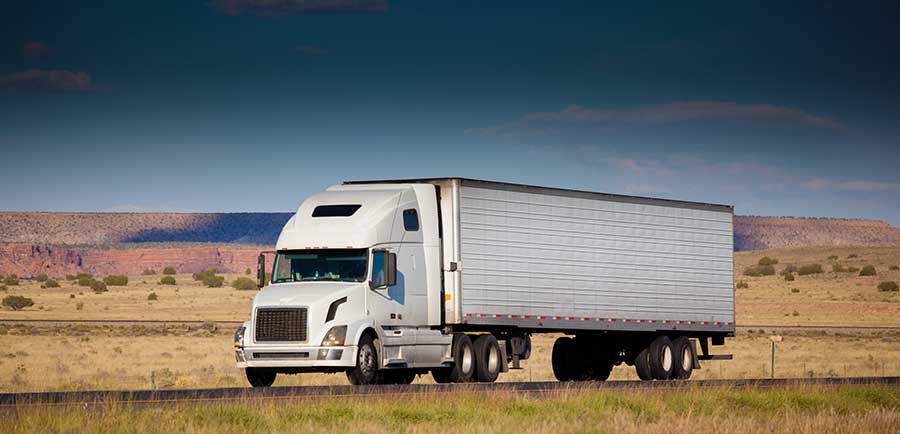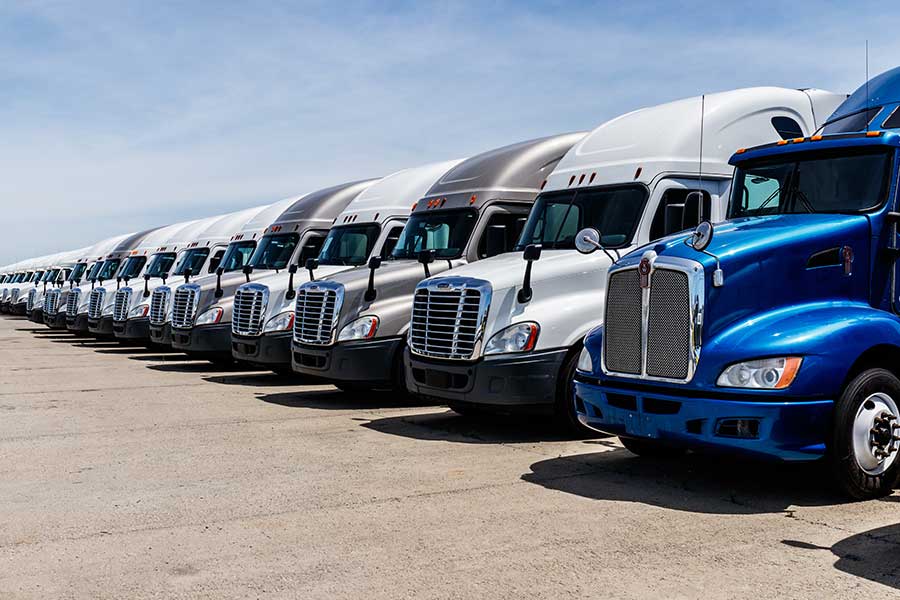If you’re looking for a solution to temporary hauling, storing, or moving needs, renting a semi-truck may be the best option for you, while leasing provides a long-term solution. We will go over all you need to know about renting and leasing a semi-truck or trailer so that you can feel confident about your decision.
There are plenty of vehicle rental agencies throughout the US that has semi-trucks available for rent. Renting is great for those needing a semi-truck temporarily, as opposed to leasing. The cost of renting is typically about $200 per day, and renters must have the appropriate licensing.
To learn more about the available options for renting or leasing a semi-truck or semi-trailer, keep reading.
Contents
Semi-Tractor Vs. Semi-Trailers

Before we can go over the rental process and costs, you should understand the difference between the two components of a semi-truck: the semi-tractor and the semi-trailer. The semi-tractor is what powers the semi-truck and the part of the semi-truck where the driver sits to operate it.
The semi-trailer is what holds and encloses the goods that are loaded onto it. It has its own set of wheels separate from the semi-tractor, but without the semi-tractor, the semi-trailer cannot be moved. These trailers come in various sizes and can be used simply for transporting loads and storing loads when placed detached on a lot of land.
Without a semi-trailer hitched, the semi-tractor alone has a short flatbed. When the semi-trailer is hitched, this creates the semi-truck. Renting, leasing, or purchasing a semi-truck generally comes with both the semi-tractor and semi-trailer together, depending on their individual needs. However, those renting a semi-truck can request to rent a semi-tractor alone, given they already have a trailer at home or at a business with the appropriate specifications. Some rental companies offer rentals of the semi-tractor alone.
Semi Truck Rentals & Costs

Throughout the United States, there are various semi-truck rental agencies, and a quick internet search will bring up all the available options in your state. If you’re looking to rent a semi-trailer by itself, you’ll need to specify this in your search.
Semi-trailers will still need to be pulled by a semi-tractor, so you’ll need to either already have a semi-tractor to rent the semi-trailer or have the semi-trailer dropped off at your location if the rental company offers that service. This is especially useful if you’re looking to lease a semi-trailer for storage use only, rather than for hauling and transporting.
Some of the most common semi-truck rental and leasing companies that have locations across the country include Ryder and Penske, as well as some smaller businesses that vary by state. Choosing a wide variety of semi-trucks, these companies offer leasing and rentals of semi-trucks to individuals and companies. A company may want to lease a semi-truck if a renter plans to transport goods for a long period of time without having to purchase the truck. Rentals are generally better for one-time or short-term use, such as moving into a new home or building and can provide a greater alternative than renting a U-Haul.
While the cost of renting a semi-truck varies by company and the type of semi-truck, it will generally cost you about $200 to $230 per day on average. This is the typical cost of just the semi-tractor by itself, and oftentimes rental companies will charge an extra $60-$150 a day for the attached semi-trailer. You can expect to pay somewhere between $250 and $400 per day for a semi-truck.
Renting Vs. Leasing a Semi-Truck

As mentioned before, renting a semi-truck is great for transporting a large load once or for transporting multiple loads in the span of a few days, making it the perfect option when moving large homes, facilities, or businesses. If you plan to transport large loads of goods, supplies, or items for a long period of time, especially on a daily, weekly, or even monthly basis, leasing may be a good choice.
Leasing a semi-truck may be more suitable than buying for those with companies that are just in the beginning stages or for individuals who have a poor credit score that prevents them from buying. Leasing eliminates the forever commitment that buying places you into because at the end of your lease (which generally lasts for about a year), you can trade in the semi for a better model if you’ve paid it off, you can pay the rest of the cost to receive ownership, or just return the truck to the leasing company. You can even renew your lease for the truck.
This is great for companies that are starting out because your company needs are going to evolve and change, especially within the first few years, and a lot can change within the time that your lease starts and ends.
If you want to use a semi-truck more long term without the hassle and credit requirements of buying a semi-truck, you can lease one from a leasing company instead of buying. The average cost of leasing a new semi-truck, with fluctuations varying by company and type of semi-truck, is about $1,600 to $2,500 per month, or $150 to $200 per week. Some leasing companies will require a down payment of about $1,000. Leasing a used semi-truck will cost a bit less at about $800 to $1,600 per month. These costs do not include insurance costs.
Renting Vs. Leasing a Semi-Trailer
If you already own or you’re currently leasing or renting a semi-truck, you may want to lease a semi-trailer to attach to your semi-tractor that is a different size or made for a different purpose than the trailer your semi-truck came with based on your needs. If you want to use a semi-trailer by itself for storage purposes, leasing will be the best option for you. You may have different goods that you need to store or transport, and the trailer may need to be switched out based on the types of goods you’re trying to store or transport.
You should first determine how long you’ll need to store the particular goods you will be using your semi-trailer for or determine how often you’ll need to transport those types of goods. The longer you will need to store these goods or the more often you’ll need to transport these goods, the more appealing leasing a semi-trailer becomes. Temporary needs, on the other hand, are better solved by renting.
The costs of renting a semi-trailer vary by company and the type of semi-trailer (which vary by purpose; i.e. what needs to be stored or hauled in the trailer), but the average cost of a typical dry van trailer, which is used to transport a variety of dry goods, is about $600 to $700 per month alone. A loan or lease of a new dry van semi-trailer can cost you up to a total of $60,000, but leasing the vehicle is going to cost you less per month than buying. Used dry van trailers are going to come to a total of closer to $27,000 or less throughout your loan or lease period.
What You Should Know Before You Rent or Lease

Before you sign your lease or rental paperwork, you should find out a few things about the semi-truck you’re about to pay for. Before you even go to the semi-truck lot, you should make sure you have an idea of what kind of semi-truck will fit your needs, that you have the appropriate licensing for that kind of semi-truck, and that you know how to drive a semi-truck.
When doing your research, you should not only make sure that the semi-truck you’re looking for will be the correct size for your load but that both the tractor and trailer have all the features you desire or need depending on the purpose for which you will be renting or leasing it for.
Research what kind of license is required for the type of semi-truck you need in order to be able to drive it, and be sure to follow the steps identified by your state DLD to attain this license. The bigger the truck, the more likely a license will be required. During this licensing process, you likely will only have to take a written test and not a driver’s test or road test.
Whether the semi-truck requires a license to drive in your state or not, you’ll want to practice driving a semi-truck or look up driving tips online before you go to the rental or leasing office. Driving a semi-truck is much different than driving a regular car, and it will take some getting used to. Before your first drive, watch some videos that have driving and maneuvering tips to help you get around in your semi-truck.
Once you feel prepared and confident in your semi-truck choice and driving ability, be sure to ask the rental or leasing agency all the questions you can think of regarding your rental or lease before you sign.
For example, if you’re renting a semi for moving purposes, you may want to take into consideration whether or not the rental truck comes with or includes a lifting gate, moving dollies, and/or a ramp. Before you drive the truck off the lot, ask to see the truck so you can inspect it. You can check the interior to make sure nothing was left behind by the previous renters and that the interior is clean, as well as check that the tires are properly filled. The rental company will fix any issues you find before renting out to you.
Styles of Semi-Tractors

If you’re unsure what type of semi-tractor you will need or want before you rent or lease, you can review the most common types below. Remember that the semi-tractor is the component of the semi-truck that provides power to the truck and hauls the semi-trailer.
- Day cab – Basic semi truck tractor with rear windows. Ideal for day travel. Doesn’t accommodate sleeping or overnight travel. Versatile to any semi-trailer and easier to maneuver.
- Sleeper truck – Contains sleeping quarters behind the front and passenger seats. Sleeping quarters can range from a simple small bed to full RV-style amenities. Ideal for overnight travel and long-distance trips. Sleeper trucks generally haul larger loads or double/tandem trailers but are versatile for hauling any size trailer. The overhead space of the sleeper cabin on these semi-tractors varies from flat roof to mid-roof to raised roof.
- Custom Haulers – These are custom-built based on individual or business needs. These won’t be readily available to rent, lease, or buy, as they take time to manufacture after a custom build has been requested. These generally come in new condition and are often made to be bought in full.
Related Article: The Cost of a Sleeper Semi
You should also keep in mind the number of axles the semi-tractor has so that you can determine how heavy of a load it will be able to carry. If needing to haul a very heavy load, research the load laws by your state to make sure the semi-truck you purchase has a towing capacity that meets these laws. Even if you’re not pulling an illegal amount of load, it may still be illegal to drive semis with weight capacities above the limit of the law on the road.
Semi-tractors with a single axle can tow a load of up to 20,000 pounds, while double axle semis can tow up to 34,000 pounds, and a triple axle semi can tow up to 80,000, which is generally the limit for most states. Make sure you aren’t towing more than the towing limit for the number of axles your semi has.
Types of Semi-Trailers
Depending on the types of items you want to tow with your semi-tractor, the type of semi-trailer you attach to it will vary. These types fall into four general categories that are listed below.
- Dry van trailer – The most common type of trailer. Used to transport non-perishable items and goods, including electronics, clothing, household goods, machinery, food and beverages, and automotive parts.
- Reefer trailer – The trailer comes equipped with a refrigeration system to keep perishable foods or temperature-sensitive items or products cool. Some reefers are designed to keep items warm or hot. Oftentimes, a generator is attached to the trailer to regulate the temperature.
- Flatbed – Used to transport large items that can withstand weather or temperature changes, especially things like construction or building materials—sometimes used to transport smaller vehicles. Items must be properly and securely strapped down or hitched.
- Chassis – Generally used to transport large metal industrial containers.
Related Article: Rental Cost of a Dry Van Trailer

